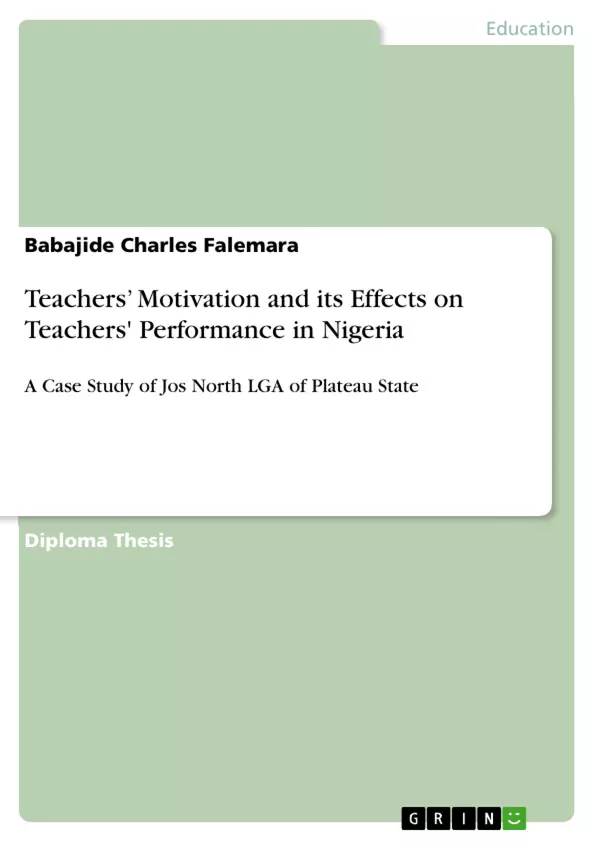The study investigated teachers’ motivation and its effect on teachers’ performance in Nigeria using a descriptive survey research design. Thirty teachers and 50 students were randomly selected from three government secondary schools in Jos North Local Government Area of Plateau State. Data was collected using a well-structured questionnaire. Responses were presented using descriptive statistics and analyzed using Pearson Product Moment Correlation Coefficient statistical method to confirm the hypotheses generated for the study at 5% probability level. The findings of this study reveal that there is a significant relationship between teachers’ remuneration and quality teaching in Nigeria.
Based on the findings of this research study, teachers' remuneration significantly affect both extrinsic and intrinsic motivating factors, increased teacher absenteeism, teachers-students interpersonal relationships as well as commitment to work, consequently contributing to dwindling educational quality and academic performance of primary school students. As such, highly-motivated, well-trained and professionally supported teachers are crucial for an effective education system in Nigeria.
Table of Contents
- CHAPTER ONE INTRODUCTION
- 1.1 Background To The Study
- 1.2 Statement of the Problem
- 1.3 Research Questions
- 1.4 Research Hypothesis
- 1.5 Objectives of the Study
- 1.6 Significance of the Study
- 1.7 Definition of Terms
- 1.8 Scope of the Study
- CHAPTER TWO LITERATURE REVIEW
- 2.1 Teachers Plight
- 2.2 Motivation
- 2.3 Classification of Motivation
- 2.3.1 Intrinsic motivation
- 2.3.2 Extrinsic Motivation
- 2.4 Conceptual Framework Showing the Possible Effect of Motivation on Teacher's Performance
- 2.5 MODEL OF FACTORS THAT CAN OPERATE AS TEACHER INCENTIVES
- 2.6 Monetary and Non-Monetary Benefits
- 2.7 Motivation of Teachers and Performance
- 2.8 Teachers' Motivation and its Challenges
- 2.9 Motivational Strategies
- 2.10 Historical Background of Jos North LGA
- 2.11 Key Research Studies
- 2.12 Breakdown of Student Performance in External Examination in Nigeria
- CHAPTER THREE METHODOLOGY
- 3.0 Introduction
- 3.1 Research Design and Sampling Procedure
- 3.2 Population and Sample
- 3.3 Method of Data Collection
- 3.4 Validity and Reliability
- 3.5 Method of Data Analysis
- 3.6 Limitation of Study
- CHAPTER FOUR RESULTS AND DISCUSSION
- 4.0 Introduction
- 4.1 Results
- 4.1.1 Questionnaire for Teachers
- 4.1.2 QUESTIONNAIRE FOR STUDENTS
- 4.1.3 Statistical Analysis - Correlation
- 4.2 Discussion
Objectives and Key Themes
This research aims to investigate the connection between teachers' motivation and their performance in Nigeria. The study focuses on the impact of teacher remuneration on educational quality in Jos North Local Government Area of Plateau State.
- The relationship between teacher motivation and performance.
- The influence of teacher remuneration on educational quality.
- Factors that contribute to teachers' motivation.
- The impact of motivation on teacher absenteeism and teacher-student relationships.
- Strategies to enhance teacher motivation and performance.
Chapter Summaries
Chapter One introduces the research topic, outlining the background of the study, the problem statement, research questions, hypotheses, objectives, significance, definition of terms, and scope. Chapter Two delves into the relevant literature, exploring the concept of teachers' plight, motivation, classification of motivation (intrinsic and extrinsic), conceptual framework, teacher incentives, monetary and non-monetary benefits, teachers' motivation and performance, motivational strategies, and the historical background of Jos North LGA. Chapter Three outlines the research methodology, including the research design, sampling procedure, population and sample, data collection methods, validity and reliability, data analysis techniques, and study limitations. Chapter Four presents the results of the research, focusing on data collected through questionnaires and statistical analysis, specifically Pearson Product Moment Correlation Coefficient. It also includes a discussion of the findings.
Keywords
This research focuses on teacher motivation, teacher performance, remuneration, educational quality, intrinsic motivation, extrinsic motivation, teacher incentives, teacher absenteeism, teacher-student relationships, and the Nigerian educational system. The study uses quantitative research methods, including questionnaires and statistical analysis, to investigate the relationship between these key concepts.
- Citation du texte
- Babajide Charles Falemara (Auteur), 2013, Teachers’ Motivation and its Effects on Teachers' Performance in Nigeria, Munich, GRIN Verlag, https://www.grin.com/document/418753



